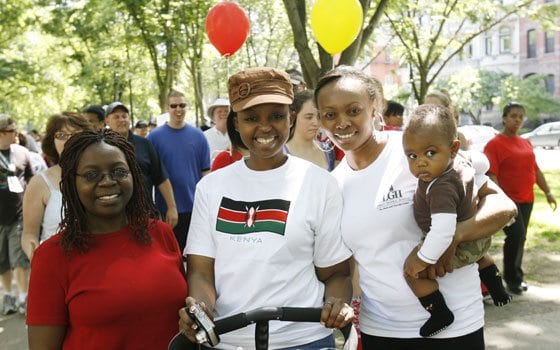

Author: AIDS Action Committee of MassachusettsEach year, 15,000 people participate in AIDS Walk Boston. Participants raise money through pledges and walking or running in the Larry Kessler 5K Run. This year is the 25th anniversary of AIDS Walk Boston and will be held on June 6. For more information, visit www.aidswalkboston.org.
Dorchester resident Letitia Richards watched her Aunt Deborah slowly pass away six years ago from AIDS.
She lived with the disease for 20 years, and when she passed it was so slow and painful, that her family wished for an end to her suffering.
“It was just so sad seeing her dying,” said Richards, “and her mental ability was diminishing as well, so she wasn’t recognizing people. It was very sad.”
In her Aunt’s honor, she started Deborah’s Team — a group of 10 to 20 friends and family members who raise money each year for the AIDS Walk, sponsored by the AIDS Action Committee of Massachusetts (AAC).
This year is the 25th anniversary of the AIDS walk, which will be held on Sunday, June 6 at the DCR Hatch Memorial Shell on the Charles River Esplanade in Boston. The walk raises AIDS awareness and funds programs such as the M.A.L.E. Center, a resource for young men diagnosed with HIV/AIDS, and policy work such as legalizing needle exchange and pharmacy access programs for Massachusetts residents living with HIV/AIDS.
Each year in Massachusetts, 600 people, mostly in communities of color, are diagnosed with the disease. One rapidly growing segment of the HIV population is black women.
Rebecca Haag, president and CEO of AAC, called the statistics on black women “shocking.”
“AIDS continues to be the number one cause of death in the United States for black women 35-44 and the number two cause of death for black women 45-54.”
Black women, like Richard’s Aunt Deborah, comprise almost half of all women living with HIV/AIDS. According to the most recent Massachusetts HIV/AIDS Fact Sheet, between 2005 and 2007, almost 250 black women were diagnosed with HIV/AIDS after having unprotected sex with partners of unknown risk and HIV status.
That risky behavior is the leading cause of exposure to the disease for African American women and is much more common than the use of infected needles. Infection rates weren’t half as high for either white or Latino women during those years.
“We know how HIV is transmitted,” said Haag, “we know what causes it, we just need to reach people — and I think so much of it is black women not knowing they are at risk.”
The existing stigma is that HIV/AIDS is a disease that affects bisexual and gay men only. While it remains true that a staggering amount of men who have sex with men continue to be exposed to the disease each year, the 1,251 women living with HIV/AIDS in Boston might argue that the “it will never be me” mentality is no longer justified.
“All it takes is one person, one time,” said Associate Professor of Social Work at Simmons College and AAC activist, Gary Bailey. “Women cannot wait for someone else to take care of them; they have to be able to negotiate for themselves their own care and protection.”
Bailey believes that the spread of HIV/AIDS can be prevented by keeping the conversation alive and fresh. One way that happens is with AAC’s AIDS Walk.
“The walk, and particularly the 25th anniversary,” Haag said, is crucial “to really raise awareness that the disease is still here, that many of our young people are still threatened by it [and that it is] particularly having a despairing impact on communities of color. Just by walking every year and getting 15,000 people to come and see our banner; even if they don’t come — to hear about the walk … to educate people and engage them in the issue. If any of that information can encourage people to get tested and practice safe sex, that’s a plus.”






